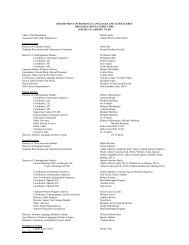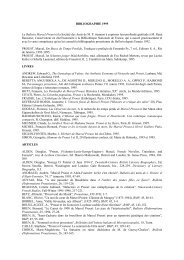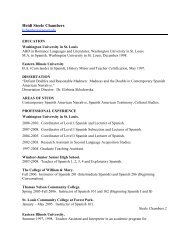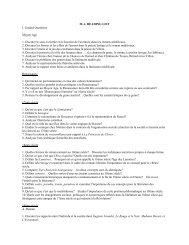Curriculum Vitae [pdf] - Romance Languages and Literatures
Curriculum Vitae [pdf] - Romance Languages and Literatures
Curriculum Vitae [pdf] - Romance Languages and Literatures
- No tags were found...
Create successful ePaper yourself
Turn your PDF publications into a flip-book with our unique Google optimized e-Paper software.
ELOISA PALAFOX M.<strong>Curriculum</strong> (short version)EDUCATION:PhD in Spanish Language <strong>and</strong> <strong>Literatures</strong>, Michigan State University: 1991-93. ABD: May 1992 (GPA 4/4). Major field of concentration: Medieval SpanishLiterature. Dissertation defense: August 18th, 1993. Director: Joseph T. Snow.Doctorado en Literatura Hispánica (equivalent of PhD), El Colegio deMéxico, México D.F.: 1987-1996. ABD: June 1990 (GPA:9.5/10). Major fieldsof concentration: Medieval Spanish Literature <strong>and</strong> Latin American Literature.Dissertation defense: June 5th, 1996. Director: Beatriz Mariscal.Maestría en Literatura Hispánica, El Colegio de México, México D.F.: 1987-88.MA in <strong>Romance</strong> <strong>Languages</strong>, The University of Georgia, Athens, Georgia:1986-87, 1990-91. Major: Spanish; Minor: Italian. Thesis: "Voz y oralidad enCelestina," approved "With distinction." Major Professor: Joseph T. Snow.Licenciatura en Literatura Latinoamericana, Universidad Iberoamericana,México, D.F.: 1986, (GPA: 9.81/10), Major: Hispanic American Literature;Minor: Mexican Literature; Thesis: "La filosofía de Michel Foucault aplicada alfenómeno de la picaresca," approved with "Mención Honorífica".DISSERTATIONS:"Oralidad, autoridad y retórica en la Tragicomedia de Calisto y Melibea deFern<strong>and</strong>o de Rojas," for Michigan State Univ., Director: Prof. Joseph Snow(defended: August 18th, 1993)."Las éticas de la fábula: sobre los usos ejemplares del relato didáctico en trestextos medievales españoles (los Castigos y documentos del rey don Sancho, Elconde Lucanor y el Libro de Buen Amor)," for El Colegio de México, Director:Prof. Beatriz Mariscal (defended: June 5th, 1996).ACADEMIC HONORS:Humanities Faculty Grant: 2005-2013.Sabbatical Leaves: 2004-2005, 2011-2012.Promotion to the rank of Associate Professor with tenure (Washington Univ., St.Louis), July 2000.Summer Faculty Research Grants awarded by the Dean of the Graduate Schoolof Arts <strong>and</strong> Sciences: 1998, 1999, 2008.Sabbatical Junior Leave: Spring 1997.
Lilly Teaching Fellowship: To prepare an interdisciplinary course on thePilgrimage to Santiago de Compostela (Washington Univ., St. Louis), 1995-1996.Excellence-In-Teaching Citation (Michigan State Univ.), 1992-93.Scholberg Award (Dept. of <strong>Romance</strong> <strong>and</strong> Classical Langs., Michigan StateUniv.), Spring 1993.Research Assistantship: Michigan State Univ., to help Prof. Joseph T. Snow asAssistant Editor of Celestinesca, 1991-1993.Full Scholarship (tuition <strong>and</strong> expenses) for all the course work of the Doctoralprogram at El Colegio de México, Fall 1987-Spring 1990.Academic Exchange of the Universidad Iberoamericana (México D.F.) with TheUniversity of Georgia (Athens, Ga.), Fall 1986-Summer 1987.Diploma for the highest GPA of the Licenciatura, May 1983.Full Scholarship during the last two years of the Licenciatura (Secretaría deEducación Pública, México D. F.) .Phi Sigma Iota, <strong>Romance</strong> <strong>Languages</strong> Honorary Society (Sigma Kappa Chapter),East Lansing, MI, Spring 1992.Sigma Delta Pi, Hispanic Honorary Society, Athens, GA, Spring 1987.Gamma Kappa Alpha, Italian Honorary Society, Athens, GA, Spring 1987.PUBLICATIONS:BookArticlesLas éticas del exemplum. Los Castigos del rey don Sancho IV, El conde Lucanory el Libro de buen amor. Medievalia series 18. México: Universidad NacionalAutónoma de México, 1998.“‘E yo tomava aquella masa en escuso e fazíala pan’: el lugar de la comida en elexemplum medieval, el caso del Sendebar castellano.” Memorabilia 11 (2008):65-80. [REFEREED JOURNAL].“¡Tanto nos diessen del paraýso qu<strong>and</strong>o allá vamos!”: la retórica de la comida enla Tragicomedia de Calisto y Melibea.” Revista Canadiense de EstudiosHispánicos: 32.1 (2007):71-88. [REFEREED JOURNAL; MONOGRAPHIC ISSUE]“Medieval Spanish Exempla Literature.” Dictionary of Literary Biography vol.337. Castilian Writers 1200-1400. Eds. Frank Domínguez <strong>and</strong> George D.Greenia. Farmington Hills, Michigan: Thomson Gale, 2007. 359-370[INVITED/CONTRACTED ARTICLE IN COMPREHENSIVE VOLUME].
“El ´nuevo´ mundo sin Celestina: reflexiones en torno a la ética y estética de losactos añadidos” Actas del Simposio Internacional 1502-2002: Five HundredYears of Fern<strong>and</strong>o de Rojas´ Tragicomedia de Calisto y Melibea (18-19 deoctubre de 2002, Departamento de Español y Portugués, Indiana University,Bloomington). Spanish Series 137. Ed. Juan Carlos Conde. New York: HispanicSeminar of Medieval Studies, 2007. 209-225 [REFEREED COMMEMORATIVEVOLUME]“Las voces en el texto: reflexiones en torno a la representación de la palabrahablada en el Libro de los exenplos por a.b.c.” “Los bienes, si no soncomunicados, no son bienes.” Diez jornadas medievales Eds. AxayácatlCampos, Mariana Masera y María Teresa Miaja. México: Universidad NacionalAutóma, Universidad Autónoma Metropolitana y El Colegio de México, 2007.183-203 [REFEREED COMMEMORATIVE VOLUME]"Antes y después: la voz de Melibea en la transición de la Comedia a laTragicomedia." Females Voices <strong>and</strong> Male Authors. Ed. Louise Haywood. Papersof the Medieval Hispanic Research Seminar. London: Queen Mary <strong>and</strong> WestfieldCollege, 2000. [REFEREED VOLUME IN REFEREED SERIES]“Las fábulas del poder: una lectura de El conde Lucanor.” [Part of a collectiverefereed volume of the Medievalia Project]. México: Universidad NacionalAutóma, 2000. [REFEREED VOLUME IN REFEREED SERIES]“De plumas, plumíferos y otros seres alados: trayectoria y enigmas de unametáfora polifacética de la Tragicomedia de Calisto y Melibea.” Celestinesca23, 1999. [REFEREED JOURNAL]“De sabios, brujas y burdeles: Celestina y su mundo antiejemplar.” ConcentusLibri 10, 1999. [INVITED ARTICLE IN COMMEMORATIVE ISSUE]"Oralidad, pensamiento mágico y retórica en la Tragicomedia de Calisto yMelibea: a propósito del uso de los refranes." "Quién hubiese tal ventura":Medieval Hispanic Studies in Honour of Alan Deyermond. Ed. AndrewBeresford. London: Queen Mary <strong>and</strong> Westfield College, 1997. 341-351.[REFEREED VOLUME]“De las Vidas paralelas a El dueño de las estrellas de Juan Ruiz de Alarcón:lectura de una re-creación estratégica.” De la Edad Media al siglo XVIII. Ed.Marta Elena Venier. Vol. 2 of Varia lingüística y literaria: 50 años del Centro deEstudios Lingüísticos y Literarios. Coord. Rebeca Barriga Villanueva. México:El Colegio de México, 1997. 3 vols. [REFEREED VOLUME]"Sobre los relatos mexicanos de brujas", Oralidad 2 (1989): 48-52. [refereedJOURNAL].Book Reviews:Consolación Bar<strong>and</strong>a. La Celestina y el mundo como conflicto. Actasalmanticensia, 303. Salamanca: Ediciones Universidad de Salamanca, 2004(Bulletin of Hispanic Studies 82.4: 2005).
WORK IN PROGRESS:María Eugenia Lacarra. Cómo leer 'La Celestina'. Guías de lectura Júcar.Madrid: Ediciones Júcar, 1990 (Celestinesca 18.1: 1994).BookLas máscaras del saber: oralidad, retórica y escritura en Celestina. A book onorality, authority <strong>and</strong> rhetoric in Celestina (also called Tragicomedia de Calisto yMelibea) Prof. Alan Deyermond, a member of the editorial board of TamesisBooks (London, Engl<strong>and</strong>), reviewed an earlier draft, suggested certain changes,which I have made, <strong>and</strong> recommended that Tamesis continue to consider itspublication. At a later date, the Editor of the Series suggested submitting thewhole manuscript for definite approval by the editorial board.Nuevos acercamientos teóricos al estudio del exemplo medievalcastellano. I have delivered various conference papers to report the resultsof my research in this subject, <strong>and</strong> I have also published two articles thatwill eventually be part of this monographic study. This will be my secondbook on medieval Spanish exempla.Articles“Lo que la psicología del siglo XXI puede aportar al estudio del didactismomedieval” (forthcoming, in book about the exemplum edited by AurelioGonzález <strong>and</strong> María Teresa Miaja de la Peña to be published by the UniversidadNacional Autónoma de México)“Estrategias políticas y miedos mundanos: a propósito de los usos‘terrenales’ del discurso ejemplar en el libro del Conde Lucanor”“Teatralidad y didactismo in the 13 th century Castilian translation of the Calila etDimna” (to be submitted to La Corónica)“Enseñar deleit<strong>and</strong>o y enseñar asust<strong>and</strong>o: las representaciones del más allá en elLibro de los exemplos por A.B.C.” (to be submitted to the Bulletin of HispanicStudies).“Los disfraces del mal: reflexiones en torno al uso de la teatralidad en el Libro delos exemplos por a.b.c.” (to be submitted to Acta Poética).“A new possible author of Celestina.” As I updated my research on Celestina, Imade a discovery that might shed a completely new light on the never fullyresolved question of authorship of this mysterious text.“Esopete Ystoriado: food <strong>and</strong> morals in the 15th Castillian Aesopus”.Research projects:Voces y textos. El saber y sus figuras en la literatura medievalcastellana (Voices <strong>and</strong> Texts: The Images of Knowledge in MedievalCastilian Literature): A study of the ethical <strong>and</strong> aesthetical matters
elated to the use of exemplarity, the textual representation of the storage<strong>and</strong> the transference of wisdom <strong>and</strong> knowledge, <strong>and</strong> the relations betweenthe oral <strong>and</strong> the written word in medieval Spanish exemplary Literature<strong>and</strong> Celestina.On Celestina: I have presented various conference papers, published fourarticles, <strong>and</strong> I am preparing a book length monographic study (see above).TEACHING EXPERIENCE:GraduateThe Uses of Food Imagery in Medieval Spanish Texts. A study of the uses offood imagery in medieval Spanish texts. I am mainly interested in how thedifferent themes surrounding this subject, such as the processes of storing <strong>and</strong>preparing food, the act of eating, the problems of hunger <strong>and</strong> the fantasies ofhyper-abundance are used to convey ideological points, to teach ethics <strong>and</strong> toportray moral behavior. So far I have presented a conference paper on theTragicomedia de Calisto y Melibea, that I reworked <strong>and</strong> published as an article(“¡Tanto nos diessen del paraýso qu<strong>and</strong>o allá vamos!”, <strong>and</strong> another conferencepaper on Sendebar that has appeared, reworked as an article, in Memorabilia. Ialso have sketches for three other articles (one about El conde Lucanor, oneabout the Castilian version of Aesopus <strong>and</strong> one about the Calila e Dimna) that Iwill present as conference papers prior to submission for publication. As always,I also plan to integrate the product of my research into my courses. Presently, Iam teaching a new senior seminar related to this research project: Food, Wine<strong>and</strong> Love: Earthly Pleasures <strong>and</strong> Their Uses in Medieval Spanish Literature.The Cognitive Sciences <strong>and</strong> Medieval Spanish Literature: During thelast two years I have been studying these scientific approaches, especiallyto psychology <strong>and</strong> to anthropology, because I am convinced that they willhelp me enrich my studies of the medieval exemplum in particular, <strong>and</strong> myunderst<strong>and</strong>ing of Medieval Spanish Literature in general. Three of thearticles I am presently developing benefit from this approach.Warriors <strong>and</strong> Pilgrims, Sinners <strong>and</strong> Saints:Foundational Texts of MedievalCastile (13 th Cetury): Spring 2013 [NEW COURSE/NEW SYLLABUS]Exemplarity <strong>and</strong> Chivalric Fiction in 14 th Century Spain: Spring 2010[NEWCOURSE/NEW SYLLABUS]Humanismo, magia y retórica en la literatura española del siglo XV:Spring 2009 [NEW COURSE/NEW SYLLABUS].Medieval Spanish Literature, Washington University in St. Louis, 4 semesters:Fall 1997 [NEW SYLLABUS], Spring 2000, Fall 2002 [NEW SYLLABUS]. Spring2008 [NEW SYLLABUS].
The Ethics of the Exemplum, Washington University in St. Louis, 1 semester:Fall 2005 [NEW SYLLABUS].Trotaconventos, Celestina & Co.: alcahuetas, amor, magia y otros temas afines,Washington University in St. Louis, 1 semester: Fall 2003 [NEW SYLLABUS].El Libro de buen amor y la Celestina (Seminar), Washington University in St.Louis, 1 semester: Spring 1995 [NEW COURSE/NEW SYLLABUS].History of the Spanish Language, Washington University in St. Louis, 1semester: Fall 1994 [NEW SYLLABUS].Latin American Colonial Literature, Washington University in St. Louis, 2semesters: Spring 1994 [NEW SYLLABUS], <strong>and</strong> Spring 1998.Independent Graduate Studies on Medieval Spanish Literature: Fall 2009, Spring2011 (two different ones), Fall 2011.Independent Graduate Study on Colonial Literature, Spring 1996 (co-directedwith Prof. Nina Davis).UndergraduateMedieval Iberia: A World with Many Faces, through its Texts <strong>and</strong> Other CulturalArtifacts, Spring 2009 [NEW COURSE/NEW SYLLABUS], Fall 2009, Spring 2010,Fall 2010, Spring 201.Food, Wine <strong>and</strong> Love: Earthly Pleasures <strong>and</strong> Their Uses in MedievalSpanish Literature, Washington University in St. Louis, 1 semester. Fall2008 [NEW COURSE/NEW SYLLABUS].Saints, Sinners, Warriors <strong>and</strong> Piligrims: Myths <strong>and</strong> Legends in the Historyof Castile. Washington University in St. Louis, 2 semesters. Spring 2003 [NEWCOURSE/NEW SYLLABUS] <strong>and</strong> Spring 2007, Fall 2010.The Shell <strong>and</strong> the Road: A Thous<strong>and</strong> Years Across the North of Spain -The Roadto Santiago-, (Senior Seminar), Washington University in St. Louis, 2 semesters:Fall 1998 [NEW COURSE/NEW SYLLABUS] <strong>and</strong> Fall 2000.The Taste Is in the Telling: Bawdy Short Stories from the Spanish Middle Ages(Senior Seminar), Washington University in St. Louis, 5 semesters: Fall 1996[NEW COURSE/NEW SYLLABUS], Fall 1999, Spring 2001, Spring 2004, Fall 2007,Fall 2009.Medieval <strong>and</strong> Golden Age Spanish Literature (Survey), Washington Universityin St. Louis, 10 semesters: Fall 1995 [NEW SYLLABUS], Spring 1999, Spring2000, Fall 2000, Spring 2001, Spring 2002, Spring 2003, Fall 2003, Spring 2004,Fall 2007.Latin American Colonial <strong>and</strong> 19th Century Literature ( Survey), WashingtonUniversity in St. Louis, 3 semesters: Fall 1993, Fall 2006, Fall 2008.
TEACHING INTERESTS:Latin American Contemporary Literature ( Survey), Washington University in St.Louis, 3 semesters: Spring 1994, Spring 1995 <strong>and</strong> Spring 2008.Tourism <strong>and</strong> the Making of 21 st Century Spain, Spring 2011[NEW COURSE/NEWSYLLABUS].Introduction to the Study of Hispanic Literature (Survey), Washington Universityin St. Louis, 3 semesters: Fall 2005 [NEW SYLLABUS], Spring 2006, Fall 2006.Hispanic Culture <strong>and</strong> Civilization, Washington University in St. Louis, 5semesters: Spring 1996 [NEW COURSE/NEW SYLLABUS], Fall 1997, Fall 1998,Fall 1999 <strong>and</strong> Fall 2002 [NEW SYLLABUS].Spanish Conversation II (Third Year), Washington University in St. Louis, 1semester: Spring 2006.Spanish Grammar <strong>and</strong> Composition II (Third Year), Washington University inSt. Louis, 2 semesters: Fall 1995, Fall 1996, Spring 2013.Spanish Grammar <strong>and</strong> Composition I (Third Year), Washington University in St.Louis, 3 semesters: Fall 1993, Fall 1994 <strong>and</strong> Spring 2002.Intermediate Spanish (Level III), Washington University in St. Louis, 2semesters: Spring 1998 [NEW SYLLABUS], Spring, 1999 [NEW SYLLABUS].Spanish Conversation (Advanced), Michigan State Univ., 1 quarter: Summer1992 [NEW SYLLABUS]; Washington University in St. Louis, 1 semester: Spring2006 [NEW SYLLABUS].Spanish Language (Beginning <strong>and</strong> Intermediate), Univ. of Georgia, 8 quarters:1986-87, 1990-91. Michigan State University, 1 quarter <strong>and</strong> 1 semester: 1991,1992.Italian Language (First year secuence), Michigan State University, 3 quarters <strong>and</strong>1 semester: 1991-92, 1993.Independent Undergraduate Study on Colonial Literature, Spring 1994.Graduate &UndergraduateUndergraduateMedieval Spanish LiteratureRenaissance <strong>and</strong> Golden Age LiteratureSpanish Culture <strong>and</strong> CivilizationHistory of the Spanish LanguageLiterary TheoryLatin American Colonial <strong>and</strong> Contemporary LiteratureMexican LiteratureIntroduction to the study of Spanish <strong>and</strong> Latin American LiteratureSpanish Language at all levelsACADEMIC SERVICE:
SPAINMember of the Editorial Council of Celestinesca: 2002-2013 (Valencia, Spain)Member of the Editorial Board of Ediciones Académicas a series published byArs Libri (Sociedad Española para la Reproducción de Manuscritos Medievales)Madrid, Spain 2000-2008.Member of the Editorial Board of Consentus Libri, Madrid, Spain 1999-2008.MEXICOUSAReferee reader for the journal Medievalia, Mexico City, Mexico1997-2012.WASHINGTON UNIVERSITY:ADMINISTRATIONAssociate Publications Editor of the Revista de Estudios Hispánicos, St. Louis,Missouri 2010-2013.Member of the Editorial Board of the Revista de Estudios Hispánicos, St. Louis,Missouri 1993-2002, 2006-2013.Referee reader for La Corónica, North Carolina 2004-2013.Associate Editor of Celestinesca, East Lansing, Michigan1999-2002.Member of the Editorial Board of Celestinesca, East Lansing, Michigan 1998-2002.Member of the Board of Trustees of The Mexican Institute of Mid-America, anon profit organization sponsored by the Mexican Consulate, St. Louis,MO, 1998-2009.Course planning <strong>and</strong> staffing for Spanish Division (2008-09. 2009-10): Allcourses for the graduate program, <strong>and</strong> third <strong>and</strong> fourth year literature courses forthe undergraduate program. This duty (which was until the Spring 2008, part ofthe DGS job description) includes consulting with professors <strong>and</strong> instructorsabout their teaching preferences, organizing a meeting to agree on schedule,gathering data to prepare the course listing such as new course descriptions, <strong>and</strong>making sure the new syllabi are submitted on time for approval by the curriculumcommittee. A total of 24 or 25 courses.Director of Graduate Studies, Spanish Section, 2006-07, 2007-08. Main dutiesincluded the following: course planning <strong>and</strong> staffing of all graduate courses, <strong>and</strong>third <strong>and</strong> fourth year literature courses for the undergraduate program; leading<strong>and</strong> coordinating the recruiting process of new graduate students; advising allMA <strong>and</strong> PhD students; transferring graduate credits from other U.S. <strong>and</strong> foreigninstitutions; preparing MA exams, coordinating the preparation, administration<strong>and</strong> evaluation of both MA <strong>and</strong> PhD exams; attending PhD oral exams;organizing mock interviews to prepare students for job market.
Director of Undergraduate Studies, Spanish Section, 1999-2000, 2000-01, 2002-03, 2003-04. Main duties included the following: course planning, supervisingthe registration numbers <strong>and</strong> distribution of students at the beginning of eachsemester, advising of all new majors <strong>and</strong> minors (approx. 50 a year), transferringcredits from other U.S. institutions <strong>and</strong> non-WU study abroad programs,mediating in placement issues <strong>and</strong> student/teacher issues, attending defenses ofhonor’s thesis, preparing <strong>and</strong> attending Spanish table at the majors/minors fair,attending Spanish reception for freshmen, attending coffee with teachers duringSpanish Day, organizing special visits of highschool groups to get acquaintedwith the Spanish program at WU.Member of the Graduate Council, 2006-07.Member of the Admissions Committee for the MA <strong>and</strong> PhD in Spanish, 2005-06,2006-07, 2007-08, 2008-09: Reviewed c<strong>and</strong>idates´ dossiers, interviewedc<strong>and</strong>idates both by phone <strong>and</strong> on campus, met with committe to work in theselection process.Coordinator of Intermediate Spanish, Level III, 1997-98, 1998-99.Coordinator of the Conversation courses, Fall 1994-Fall 1996.Department link with University College, 1995-96 <strong>and</strong> 1997 to the present.Coordinator of the Study Abroad Program in Chile, Fall 1996.Organizer of the Spanish Suite, 1996-97.Department Coordinator for the United Way Campaign, Fall 1996, Fall 2005.ADVISINGGraduateAcademing Advisor for all the MA <strong>and</strong> PhD students in the Spanish Section:2006-07, 2007-08 This was part of the job of Director of Graduate Studies.Dissertation Director of the following students specializing in MedievalSpanish Literature:Megan HavardLauren TaranuJosé Licón.Faculty Advisor of the medieval Spanish reading group (formed by graduatestudents who meet every three weeks during the academic year), Fall 2010 to thepresent.Director of the PhD dissertation of Boncho Dragiyski: “Good Sins: 13 thCentury Perceptions of Non-Normative Behavior” [DEFENDED: SUMMER2012].Director of the PhD dissertation: "El agua a su molino. Cuatro historiadoresnovohispanos y sus crónicas en castellano: Fern<strong>and</strong>o de Alva Ixtlixóchitl,
Hern<strong>and</strong>o Alvarado Tezozómoc, Diego Muñoz Camargo y Juan BautistaPomar," by Juan José Daneri (DEFENDED: FALL 2002).Co-director (with Prof. Norris Lacy) of the PhD dissertation: "Motolinía, Olmos,<strong>and</strong> the Staging of the Devil in Early Colonial Mexico," by DanielMosquera. (DEFENDED: MAY 1998).UndergraduateAcademic Advisor for Spanish Majors <strong>and</strong> Minors: 1994-06, 2008-13.Advising of five students taking Med-Ren 310C: The Middle Ages MultipleViews of Culture (a course I team taught along with other faculty members), onthe preparation of their projects <strong>and</strong> final papers. At the end of the semester, Ialso read <strong>and</strong> graded those final papersMEMBERSHIPS:Modern Language Association of America.Asociación Hispánica de Literatura Medieval.Asociación Internacional de Hispanistas.International Courtly Literature Society.Iberomedieval Association of North America.MedievaliaLira MínimaFriends of the Road to Santiago.


![Curriculum Vitae [pdf] - Romance Languages and Literatures](https://img.yumpu.com/47436285/1/500x640/curriculum-vitae-pdf-romance-languages-and-literatures.jpg)
![Curriculum Vitae [pdf] - Romance Languages and Literatures](https://img.yumpu.com/45153467/1/190x245/curriculum-vitae-pdf-romance-languages-and-literatures.jpg?quality=85)
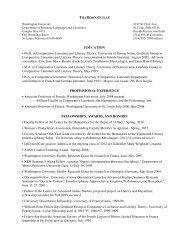
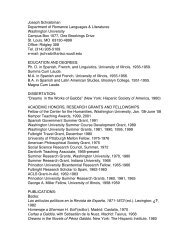
![Curriculum Vitae [pdf.] - Romance Languages and Literatures](https://img.yumpu.com/34075562/1/190x245/curriculum-vitae-pdf-romance-languages-and-literatures.jpg?quality=85)
![Curriculum Vitae [pdf] - Romance Languages and Literatures](https://img.yumpu.com/34075453/1/190x245/curriculum-vitae-pdf-romance-languages-and-literatures.jpg?quality=85)
![Curriculum Vitae [pdf] - Romance Languages and Literatures](https://img.yumpu.com/34075417/1/190x245/curriculum-vitae-pdf-romance-languages-and-literatures.jpg?quality=85)
